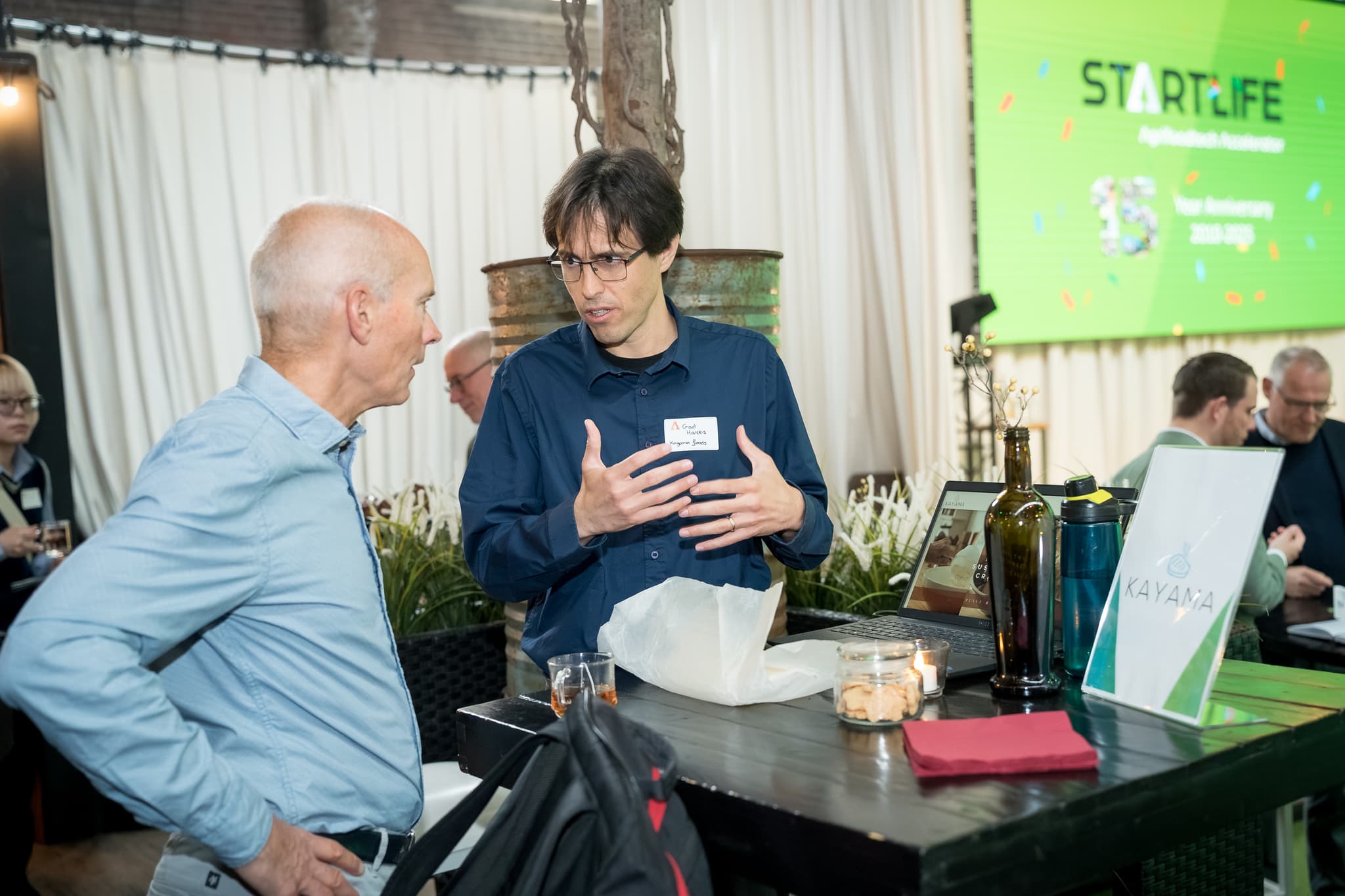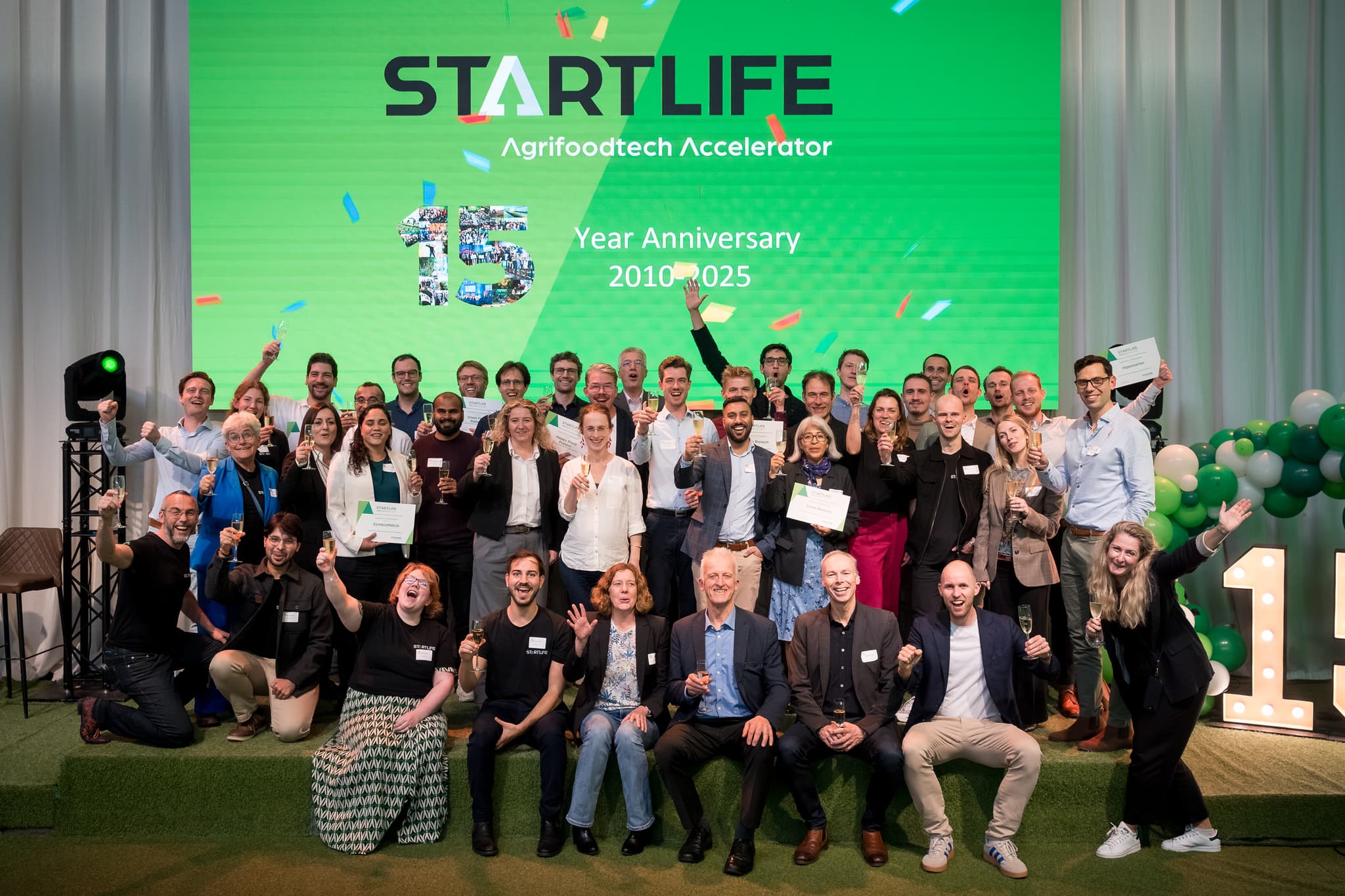Kayama Foods: Reinventing fat for a healthier, tastier future
A plant-based innovation that behaves like butter and tallow — but without the guilt.
Published on November 29, 2025

Gad Harris from Kayama © StartLife
Bart, co-founder of Media52 and Professor of Journalism oversees IO+, events, and Laio. A journalist at heart, he keeps writing as many stories as possible.
At StartLife’s 15th anniversary celebration in Ede, eleven pioneering agrifoodtech startups took the stage to show how science and entrepreneurship can reshape the future of food. From smarter biostimulants and energy-efficient farming robots to next-generation proteins and nutrient innovations, each team presented a bold solution to one of the world’s most urgent challenges: feeding a growing population within planetary limits. In this IO+ series, we highlight their stories; not just the technologies they’re building, but also their vision and the advice they received from the expert panels. Today, we focus on Kayama Foods.
When Gad Harris took the stage at StartLife’s Demo Day in Ede, he didn’t begin with data or science. He began with a smile and a question. “Who likes food?” Hands shot up across the hall. “Yeah,” he grinned, “not surprising. We all like it. But I’m talking about that tasty, juicy, scrumptious, aromatic stuff. The kind that makes you close your eyes for a second. We’re all programmed to prefer those foods; it’s a feature, not a bug.”
The audience laughed, but his point was serious. “The problem,” he said, “is that this natural preference leads us to make not-so-healthy choices. Usually, the tastier the food, the worse it is for us. And there’s often one ingredient to blame: fat.”
The taste-health tradeoff
Harris, co-founder and CTO of Kayama Foods, knows the food industry inside out. He has spent years studying how to bridge the gap between health and indulgence, a gap that has frustrated food manufacturers for decades. “Saturated fat delivers extraordinary sensory outcomes,” he said. “It gives you the taste, the mouthfeel, the aroma. But it comes at a cost to our health and to the planet.”
Food producers, he explained, are caught in a bind: consumers demand healthier products but still expect the texture and flavor of the original. “They’re failing on both,” Harris said. “That’s blocking growth into new categories and segments.”
Structuring the future of fat
Kayama’s answer is what Harris calls a physically structured fat: a technology that can transform healthy, liquid, plant-based oils into solid, stable fats that look, feel, and behave like animal-derived ones. “We can take natural oils and turn them into something solid that behaves just like the real thing,” he explained. “Up to 90% less saturated fat, no cholesterol, all natural, and entirely plant-based.”
In other words: butter and tallow, reimagined for the 21st century.
The company has already developed two prototypes. “One resembles the properties of beef tallow,” Harris said, “perfect for meat alternatives or shortening. The other mimics butterfat, ideal for chocolate, confectionery, and bakery applications.” Both deliver hardness, spreadability, and stability, the physical traits food manufacturers rely on to achieve consistent quality.
“Our technology is patent-pending,” he added, “and everything we produce is clean label: no artificial additives. We’re now producing tens of kilos and delivering samples to potential clients for inspection.”
Scaling up while staying focused
Kayama’s plan is as ambitious as it is practical. Within one to one and a half years, the team expects to reach full commercialization. To get there, they are fundraising $1 million, half of which has already been secured through a non-dilutive grant. “That will take us to regulatory clearance and commercialization in Europe,” Harris explained.
The startup’s team of three - “a businesswoman, an engineer, and a chef” - brings together culinary creativity and deep technical expertise. “We like to say we’re engineering the pleasure of food,” Harris smiled. “Making it both healthy and desirable.”
Balancing corporate and venture capital
After his pitch, Harris turned to the panel with a question that many early-stage founders wrestle with. “At this pre-seed stage,” he said, “we’ve found interest from both traditional VCs and strategic corporate partners. How do we balance between these two types of funding to ensure long-term support and alignment?”
The responses came quickly. “Building your cap table is one of the most important parts of your business,” one panelist advised. “Corporates and investors can both be valuable, but they think on different timelines. Corporates often stay longer; VCs usually want to exit after a few years. Before you decide, make sure they’re aligned; otherwise, you’ll end up with conflicts in your boardroom.”
Another added a practical note: “If you include corporates early, your fundraising cycle might stretch. Think about your runway: regulatory clearance can take longer than expected, and you don’t want to be raising again in a month.”
A third voice offered caution. “Be very careful with contracts. Don’t give exclusivity too early as it can limit your flexibility later.”
Another piece of advice was about value: “You can actually play with exclusivity,” one of the experts said. “Maybe you don’t give away chocolate as a whole category, but you could grant exclusivity for chocolate bars containing nougat. That way you preserve control while still offering value.”
From tallow to tomorrow
When an audience member asked if Kayama’s product qualified as a novel food under EU regulation, Harris was ready. “All our ingredients are FDA GRAS approved in the US,” he replied. “Part of them are already approved in Europe, and we’re working with an advisor to secure clearance for the rest.”
That combination of technical readiness and regulatory awareness made Kayama one of the standout pitches of the day. Their goal isn’t just to make plant-based food taste better; it’s to eliminate the tradeoff between taste and health altogether.
“Consumers shouldn’t have to choose between delicious and good-for-you,” Harris said afterward. “We want to make food that satisfies both the body and the mind; the kind that’s good for you, and that you still dream about afterward.”
At a time when food innovation often swings between indulgence and restraint, Kayama is daring to say: we can have both.

15 years Startlife
Read about all the startups that were part of StartLife’s 15th anniversary Demo Day.
